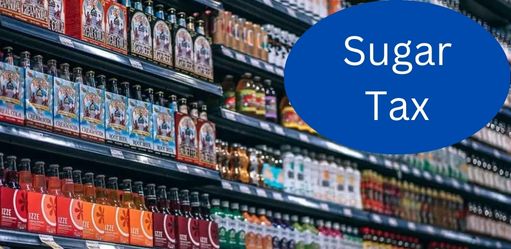Chief Executive Officer, Centre for the Promotion of Private Enterprise (CPPE), Dr Muda Yusuf, has highlighted the importance of food and beverage sector in Nigeria’s manufacturing industry, stating that the companies should not be loaded with more taxes that may affect their operations and the economy generally.
Dr Yusuf said the food and beverage sector accounts for almost 50 per cent of manufacturing contribution to the Gross Domestic Product (GDP) in Nigeria, stressing that the government should not execute policies that could add more burden to the companies in the form of taxes.
Join our WhatsApp ChannelHe stated this during Prime Business Africa Health and Business Series (4) on Sunday, 4th August 2024.
The series, hosted on X Space by Dr Marcel Mbamalu, Publisher and Editor-in-chief of Prime Business Africa, was on the topic; “Sugar Tax Removal: Your Health or Your Wealth?.”
READ ALSO: Expert Decries Poor Regulation Of Sugar In Beverage Products In Nigeria
Dr Yusuf, who is the immediate past Director General of the Lagos Chamber of Commerce and Industry (LCCI), said the recent suspension of sugar tax was to give companies in the food and beverage sector relief, given the harsh economic environment in which they currently operate.

Prime Business Africa had reported that the Federal Government suspended the N10 per litre tax on all Sugar-sweetened beverages (SSBs) for the economy to stabilize.
Yusuf said the companies are already paying other taxes to the federal government and should not be subjected to more, as they also have challenges like high foreign exchange rate, high energy costs and logistics which affect the cost of production.
“From an economic point of view, the food and beverage sector is like the flagship of our manufacturing sector, it accounts for almost 50 per cent of the GDP in manufacturing. It is the best segment of our industrial sector that has an excellent record of backward integration and that speaks to an inclusive economy; it speaks to the multiplier effect on the economy,” Yusuf stated.
He pointed out that the manufacturing sector has been the highest hit by the economic reforms of the Tinubu’s administration and that many companies, especially the foreign ones, have left the country as they couldn’t cope.
“With respect to the last reform that we had, the manufacturing sector has been the highest hit, the most vulnerable to these reforms, on account of foreign exchange, energy cost, and logistics impact on manufacturing. Capacity utilization has dropped, foreign manufacturing companies have already left the country. so, we also need to be very careful, in exerting too much pressure on even what is left of our manufacturing sector.
“So, it is very difficult to justify that we should be imposing additional taxes on these manufacturers. Already, they are paying company income tax, education tax, police Trust Fund tax, NASENI levy, land use charge, environmental tax to all sort of groups, they are paying all sort of regulatory charges. The pressure is enormous. Exchange rate has depreciated significantly, interest rate is about 30 per cent. Unless you want to cripple these manufacturing firms. I don’t think we have any strong basis to be pushing so aggressively on these beverage companies,” Yusuf submitted.
READ ALSO: Beverage Companies Charged To Key Into Sugar Reduction Campaign
Speaking directly to the topic, the economic expert said tax and health are not necessarily mutually exclusive, adding that both can coexist, but there is a need for moderation.
Many advocates of sugar reduction have opposed the decision of the federal government to suspend the tax, arguing that it is a way of indirectly discouraging excessive consumption of sugary drinks as it leads to high price of the products that many consumers cannot afford. They also stressed that funds realized from the tax, also known as sin tax, could be channeled into health intervention programmes.
However, Yusuf argued that looking at Nigeria’s average per capita consumption of sugar which is between eight and nine kilogram, the country is not yet in a threshold that should alarm anyone. He further stated that the global average of sugar consumption is around 21.4kg per annum and the World Health Organisation recommendation is 9.1 kg per annum.
READ ALSO: Sugar Tax Removal: Economic Gains Versus Health Implications
“So, from evidence-based point of view, I don’t think we are yet in a threshold that should alarm us that much. That is not to say that we should not admonish our citizens to consume less of sugar,” he added.
The CPPE CEO observed that due to high cost of things in the country, prices of sugary beverage drinks have doubled in the last one year and consumption has also dropped significantly.
He said what needs to be done is sensitization of Nigerians on healthy eating habit as their dietary culture revolves largely around carbohydrate which contains a lot of calories and sugar.
He said carbohydrate constitutes about 90 per cent of what Nigerians eat and if there is anything to worry about, it should be about the eating habit.”I think that is central to reducing the amount of sugar that we take,” he insisted.
“Taking into account the current context of the economy, it is better to look at this issue holistically, do whatever campaign we can do to educate the citizens, because this is about dietary habits largely, especially coming from the point of view of our eating habit.”
He stated that according to data, the prevalence of diabetes in Nigeria is still one of the lowest globally. “I am not saying because of that we should continue to encourage consumption of sugar, but what I am saying is that we have to be moderate, so that in the process of solving a particularly problem, we don’t create even bigger problems for the economy,” concluded.
Victor Ezeja is a passionate journalist with six years of experience writing on economy, politics and energy. He holds a Masters degree in Mass Communication.



















Follow Us